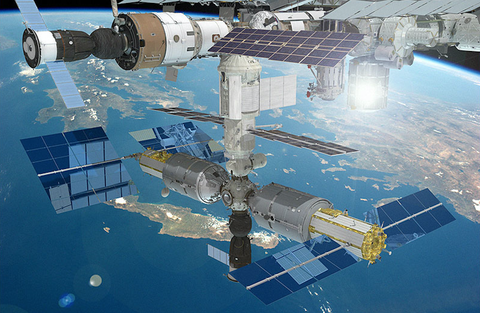Space tourism isn't a new idea. SpaceX announced plans this year to send civilians skyward and Virgin Galactic is still working toward its goal of regular space flights. Just this week, Blue Origin released footage of its future space tourism ambitions. But all these plans aren't exactly a first-class experience. Even after paying millions, a few super-wealthy adventurers have to brave spartan accommodations in orbit alongside well-trained astronauts.
But in a few years, space tourism agents might be offering five-star orbital adventures, courtesy of the Russian space agency. The amenities will include a luxury orbital suite parked at the International Space Station (ISS) offering private cabins with big windows, personal hygiene facilities, exercise equipment and even Wi-Fi. In addition gazing at our tiny blue orb from a dizzying altitude of 250 miles, space tourists will have an opportunity for space walks accompanied by a professional cosmonaut.
The entire trip, lasting from one to two weeks will cost $40 million per person and going with the spacewalk option and an extended month-long stay will set the traveler back an additional $20 million.
This is the gist of Russia’s grand scheme to return into the space tourism business. This month, Roskosmos State Corporation had began reviewing a business plan for a high-comfort addition to the ISS. According to a detailed proposal seen by Popular Mechanics, the 20-ton, 15.5-meter-long module would provide 92 cubic meters of pressurized space. It would accommodate four sleeping quarters sized around two cubic meters each and two “hygiene and medical” stations of the same volume. Each private room would also have a porthole with a diameter of 228 millimeters (9 inches), while the lounge area of the module would have a giant 426-millimeter (16-inch) window.
The external structure of the tourist module looks like the Science and Power Module, NEM-1, which Russia is currently building for the International Space Station. The second NEM module had originally been on the books in the station’s assembly scenario, but the Russian government funded only one module. It will serve primarily as a science laboratory and a power-supply station for the ISS.
Now, Russia’s prime space station contractor, RKK Energia, came up with a scheme to pay for the second NEM module through a mix of private and state investments. To make profit, the NEM-2 would be customized for paid visitors.
RKK Energia pioneered space tourism in the 1990s, first renting the Mir space station to a private firm and then flying millionaires to the ISS. However in recent years, tourist flights have been on hold because Russia’s ISS partners booked all available seats on the Soyuz spacecraft, which remains the only way to reach the outpost after the retirement of the Space Shuttle in 2011. The Soyuz will become available again in a couple of years, as NASA’s private contractors, like SpaceX, are poised to introduce orbital taxis of their own.
The proposed Russian tourist module is estimated to cost from 16.4 to 26.2 billion rubles ($279-$446 million). In order to recoup this money as soon as possible, RKK Energia plans to fly two tourists on each Soyuz flight accompanied by one professional cosmonaut. With four Soyuz flights available throughout the year, it will be possible to carry up to six tourists on short visits to the station annually while keeping professional cosmonauts in orbit on year-long shifts. At that rate, RKK Energia hopes to recoup its the module's cost in about seven years.
To minimize the initial cost, RKK Energia wants to book at least 12 passengers who would agree to make payments of around $4 million up front so that the company could begin the development of the orbital hotel module. It's a similar method that Virgin Galactic used at the beginning of its space tourism ambitions. The same clients will then pay two 12.6 million bills in the two years leading up to the flight, then paying the final $10.8 million payment at the time of the flight.
This plan bets on the growing number of multi-millionaires around the world. By some estimates, by 2021 there will be more than 43,000 people globally, whose personal fortune exceeds $30 million. It means that if just 36 of these individuals (or 0.33 percent from the whole group) choose to visit the space hotel, the module would make money.
Despite these sci-fi ambitions, the authors of the proposal admit there are a few serious problems. The main potential stumbling block is the technical complexity involved in building the new module, even if the engineers can take advantage of existing blueprints and some available spare parts from its government-funded sibling. In the past two decades, the efforts to restart the assembly of the Russian part of the ISS have been chronically behind schedule.
Currently, the launch of the NEM-1 module is planned for 2021. In the meantime, the retirement of the ISS is looming in 2028.
RKK Energia estimates that it would take at least five years to build the tourist module, which means that if the work began right away, it would make it to the station in 2022 or later. Hence, the project might not have those seven years required to pay off the investments. Also the project will be vulnerable to currency exchange fluctuations and cost overruns, the authors of the study said.
In the near future, much will depend whether Roskosmos or private investors will pony up the cash for humanity's first luxury hotel in space.
Anatoly Zak is the publisher of RussianSpaceWeb.com and the author of Russia in Space, the Past Explained, the Future Explored.















